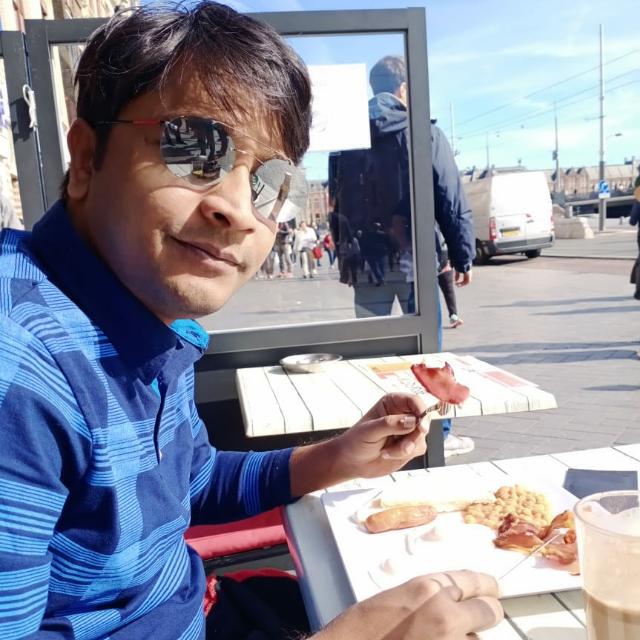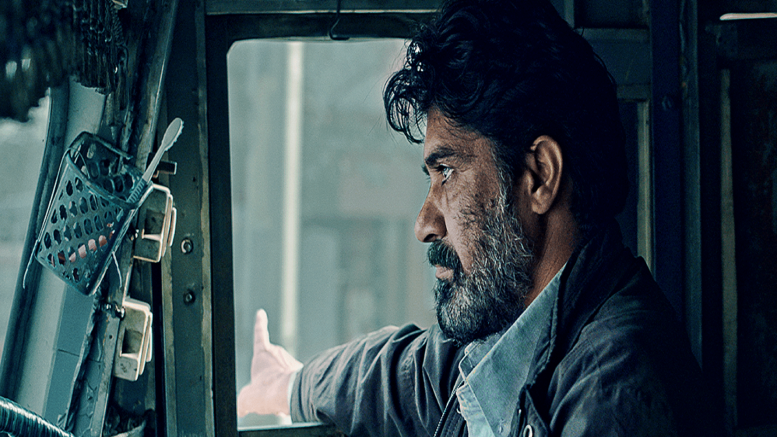Ivan Iyr’s Meel Patthar (Milestone) is a tale of all things broken: people, machines, and a system. There is a truck in need of servicing after having clocked 5,00,000 KMs, its driver who is broken down physically (he has a bad back) and mentally (he is reeling from the suicide of his wife), there is an elevator that has broken down and so is the ecosystem of the transport company that is dealing with a loader’s striker. Meel Patthar is a philosophical film that deals with a gamut of things and communicates a lot without being verbose. On a macro level the film is about the life of a trucker in the aftermath of his wife’s suicide but as they say, Devil (like storytelling) is in the details.
The film skillfully portrays Ghalib as a bridge between two generations, sympathetic to the old and threatened by the new, revealing the complexities of his trucker identity
The protagonist, played poignantly by Suvinder Vicky, is a veteran trucker named Ghalib and his views on life can be profound and poetic. But this is not a flair that he was born with, rather markings left behind from a life spent on the roads and the moments in between spent pondering on life and existence. His face does not do much, as if to say that his emotions and expressions are as weary as his body. His delivery is matter of fact without much modulation like the years passed by and the nature of the job have beaten into him a dryness that might hint at wisdom but is equal parts cynicism.

The movie beautifully leaves much unsaid, allowing viewers to imagine the logistics of Ghalib’s cross-cultural love story and the aftermath.
To quote a famous couplet of Ghalib Dil-e-nadaan tujhe hua kya hai, aakhir is dard ki dawa kya hai? (what ails you, my heart? What is the remedy for this ailment?) The remedy that Ghalib the trucker choses to supress the pain of bereavement is to fall neck deep into his work, pulling up double shifts and pilling up kilometres on the odometer. Which is why when he is revered for hitting the milestone of 5 lakh kilometres, he does not wear it like a badge of honour but treats it more like dust on his uniform or the punctures on his truck’s tyre – things that come with the job.
The symbolism, like the out-of-service elevator, adds depth, subtly reflecting the protagonist’s struggles
Ghalib is also placed as the marker between 2 generations: he is sympathetic towards the old and threatened by the new. In the old driver Dilbaug, another driver who has spoken for highly in the trucker circle but is dropped like a bad penny once his vision starts to act funny with age, he sees himself and his own future. In the upstart Pash (another character named fittingly after a poet) he sees a threat to his own job, something which in his own words “has become his only identity”. The best moments in the film are his interactions with these colleagues. In the world of trucker philosophy, he alternately plays the disciple and the mentor.
Symbolism is subtle yet powerful, such as the out-of-service elevator representing the protagonist’s struggles, much like hauling his past and pain.
Apart from all that the movie says, its beauty lies in the things that it leaves unsaid. You are free to imagine the logistics of the love tale that would have resulted in a Punjabi trucker marry a girl from far away Sikkim. The movie only tells you the ‘post driving into sunset’ moments of their life: the marriage, the dreams of moving to a city, the discords, and the suicide of one. Pash has a sister back home who routinely checks on his well being and pays his rent.
Pash offers Ghalib the option of marrying his sister. We hear the sister’s voice over calls, but we do not see her, nor are we aware of her backstory. What are the hardships she has faced to bring up Pash? Ivan leaves behind these trails as invitations to his writer’s room – the audience is free to fill in these parts and become part of the creative process.
The lack of contrived closures mirrors life’s bleak reality, emphasizing the prosaic nature of existence and the mundane journey between stops
The film is packed with symbolism and none of it too in your face. The out of service elevator in Ghalib’s flat brings about problems of hauling things (like a gas cylinder) painfully through the stairs. This is reminiscent of the protagonist who is lugging his pains and his past, not via a cruising mean machine but through one turn of the wheel at a time of an ageing truck in need of maintenance. Both Ghalib and Pash are named after poets when their own lives are morose extensions of prose: of putting together a ‘compensation’ for wife’s family and paying the rent at the end of the month.
The film’s brilliance lies in its unsaid moments, allowing viewers to participate in the narrative by imagining the unspoken aspects of Ghalib’s life
The film ends with Ghalib about to start on another trip in his truck, nothing much having changed in his life. A connection is made, briefly with a stranger but the connection could be as fleeting as the duration of the call, in all probabilities it is not the start of a happily ever after. The film is not designed to provide contrived closures and soothing solutions, instead it is a bleak depiction of just the way things largely are. After all, like Ghalib, for the most of us, existence is all about the prosaic movement between stops- seldom accentuated by high points and epiphanies.

Captive of the 24 frames and admirer of the written word. If it is not on the silver screen or on the pages of a paperback, it might as well not exist.

